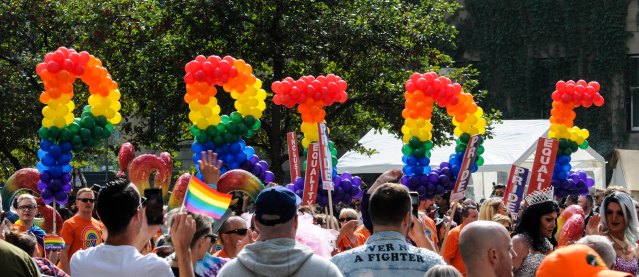
Don’t say “I’m not queer, but I’m an ally.”
One of the best things about June is how social media becomes a rainbow-covered confection for #Pride. Queer folk and allies alike celebrate the strengths of LGBTQ+ people in our community, showcasing their solidarity by change their profile pictures, post cute rainbow GIFs, and tell stories about queerness, coming out, influential queer folk (historically and contemporarily), and—of course—how much work there still is to be done.
While most of this is heartwarming and invigorating, many queer folk—including myself—are becoming increasingly annoyed with #Pride posts on social media that say things like “I may not be gay, but love is love is love,” or “I’m straight, but support the queer agenda,” or “I’m not trans*, but I’m an ally.”
Why is this a problem?
Allied friends and family, we know you love us and want to support us. And a lot of you also want to make sure you’re being respectful of not appropriating queer culture, which is a wonderful sentiment, especially in the wake of big corporations repackaging our culture and selling it back to us without giving back to the community. We see you and appreciate your efforts.
However, when you call out your own straightness (or your own cisgenderedness) in the same breath as saying you support queer folk, it feels like a backhanded compliment seasoned with a bit of superiority. It feels like you’re they’re saying “I’m not one of you, but I support you.”
It’s that “but” qualifier that does the damage. These sentiments fall into the same category as “No offense, but ___.” We all know that if a phrase starts with “no offense,” whatever comes next is probably going to be offensive. Saying “no offense, but” is a way many people distance themselves from what comes next if they’re not sure something is going to be offensive but they have a feeling it might be. They say “no offense, but” to protect themselves–so that it’s easier to not be held responsible for that inevitably offensive comment.
When an ally calls out their lack of queerness, deliberately saying “I’m not queer, but,” it makes us queer folk suspicious. It makes us feel like you’re being disingenuous. Like you’re not actually sure you’re on board with this whole queer thing. And more importantly, distancing yourself from those of us who are queer during #Pride feels like another form of othering to us.
What should you do instead?
If you feel like you need to make the distinction that you are not queer, you may need to do some self-searching to determine why you need to so clearly separate yourself from your LGBTQ+ friends and family. Perhaps you’re uncomfortable with the idea of being queer, even though you’re ok with other people being queer. Perhaps you have some internalized homophobia and/or transphobia you need to come to terms with.
#Pride is a great time to work on educating yourself and working on your own internal biases. We all have them. We are all works in progress. Identifying and deliberately addressing these biases is just something to work at in order to be a better ally.
And another way to be a good ally? When you post about supporting #Pride, don’t worry about labeling yourself before offering support. Stop with the qualifiers. Waive that rainbow flag. And move beyond your words. Show us you support rights for queer folk with your actions.
Categories: Leslie's Voice


Thanks for sharing this. Happy Pride! 🙂
LikeLike